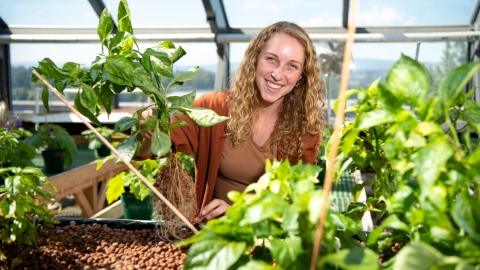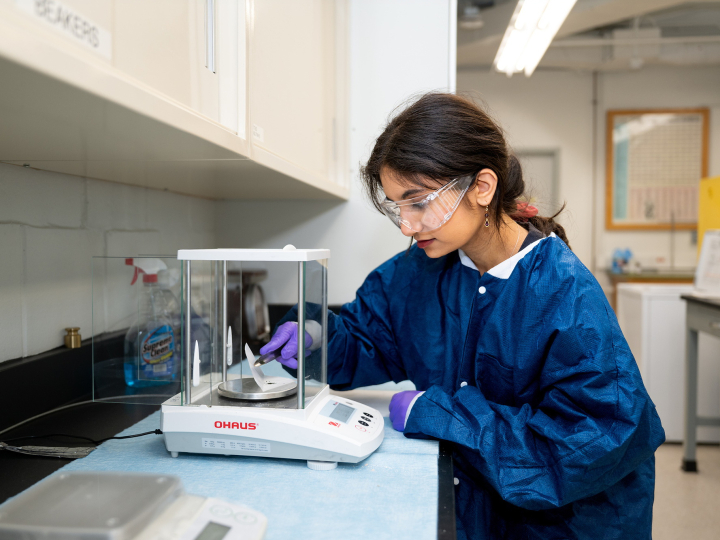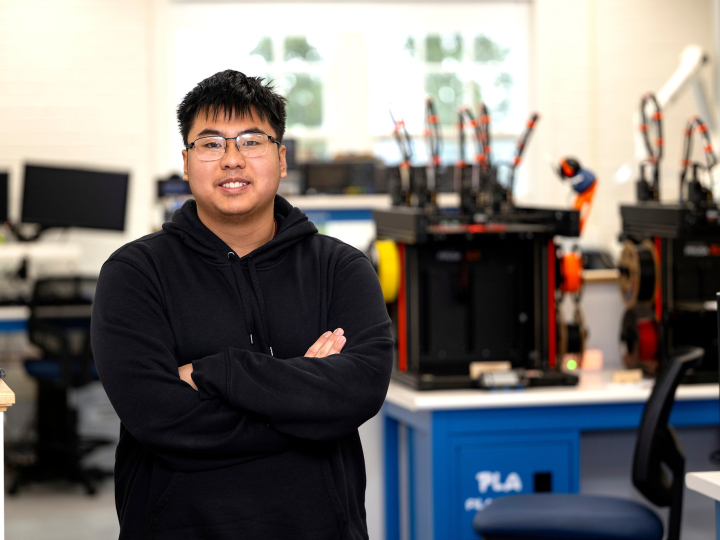
Lucille Ketterer ’23, Environmental Engineering
October 15, 2021
Lucille Ketterer '23 traveled to California to learn from aquaponics experts before setting up her own aquaponics garden in Buckell's Rooke Science Center greenhouse. Photo by Emily Paine, Communications
The independent research opportunities here are so abundant. I got to choose exactly what I wanted to do every day for 10 weeks, and I don’t think that would’ve happened for me at many other schools.
The last thing Lucille Ketterer '23 wanted to do at college was stay chained to a desk all day. As an aspiring engineer and outdoors enthusiast, she wanted to be in the field learning about the world and its myriad challenges firsthand. That's why she chose Bucknell.
"I was looking for a mentally stimulating program that would get me outside and also challenge me more than I had ever been before," says the environmental engineering major from Louisburg, N.C. "Of the three schools I was still choosing between days before the enrollment deadline, Bucknell was the only one that fit the bill."
Here, Ketterer's studies have taken her far beyond the lush forests and thriving rivers found just beyond Bucknell's classrooms — she's journeyed across the country gaining insight into modern advancements in sustainable food production.
Funded by a $7,500 award from the Clare Boothe Luce Scholars program, Ketterer spent part of summer 2021 in California researching a farming system called aquaponics. A marriage of hydroponics and aquaculture, aquaponics utilizes fish to help crops grow in water.
"Essentially, fish excrete waste that provides nutrients to the plants. As the plants absorb the waste, they naturally clean the water environment for the fish," Ketterer explains. "So it's a symbiotic relationship that cuts the need for soil, synthetic fertilizers and continuous watering almost completely."
Ketterer's work began in Half Moon Bay, Calif., where she learned the tools of the trade at a large-scale commercial aquaponics farm before getting a closer look at a simplified system at Sacramento State University. California's hot and dry climate made for "the perfect case study," she says, "because one of the biggest benefits of aquaponics is that it can be done in harsh climates."
Ketterer now maintains her own aquaponics garden in the greenhouse atop Rooke Science Center. Between harvesting bell peppers and basil, and keeping the system's 150-gallon tank running, Ketterer analyzes the bacteria responsible for converting fish waste into nutrients for the crops. Tests run on water samples and pebbles from the tank reveal the rate at which the bacteria is working, giving Ketterer a clearer picture of her system's success.
"That I get to do both hands-on fieldwork and testing in the lab all in one project is such a blessing," Ketterer says. "Spending time in the most beautiful place on campus on top of all that is a nice touch."
Whether choosing her research topic, writing the scholarship grant or hand-selecting her faculty advisers, Ketterer says being in the driver's seat of her education has been an incomparable experience.
"Bucknell has a serious advantage over research institutions that may be bigger or have slightly more expensive equipment, because the independent research opportunities here are so abundant," she says. "I got to choose exactly what I wanted to do every day for 10 weeks, and I don't think that would've happened for me at many other schools."

